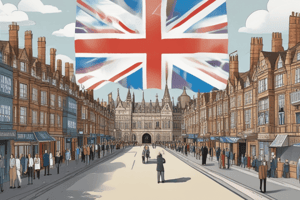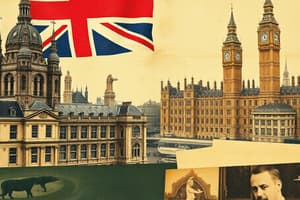Podcast
Questions and Answers
What was the primary goal of the 1832 Reform Act in Britain?
What was the primary goal of the 1832 Reform Act in Britain?
Which group received expanded voting rights as a result of the 1867 Reform Act?
Which group received expanded voting rights as a result of the 1867 Reform Act?
What was a significant outcome of the 1884 Reform Act?
What was a significant outcome of the 1884 Reform Act?
In the context of the British constitutional monarchy, what is the primary role of the monarch?
In the context of the British constitutional monarchy, what is the primary role of the monarch?
Signup and view all the answers
What institution primarily has the power to make laws in the UK?
What institution primarily has the power to make laws in the UK?
Signup and view all the answers
How did industrial growth influence British politics in the 19th century?
How did industrial growth influence British politics in the 19th century?
Signup and view all the answers
What is the primary responsibility of the Prime Minister in the British government?
What is the primary responsibility of the Prime Minister in the British government?
Signup and view all the answers
Which act followed significant worker movements and aimed to adjust constituency boundaries in Britain?
Which act followed significant worker movements and aimed to adjust constituency boundaries in Britain?
Signup and view all the answers
Study Notes
British Parliamentary Reforms
- British Parliament underwent three significant reforms in the 19th century (1832, 1867, and 1884).
- These reforms expanded voting rights and altered the balance of power within Parliament.
- The reforms were driven by the rise of the industrial middle class and the growing demands for political representation.
- The 1832 Reform Act broadened suffrage by increasing the number of voters. However, industrial workers and women were still excluded.
- The 1867 Reform Act further extended the franchise to working-class men, though there remained significant disparities in voting rights across different social groups.
- The 1884 Reform Act substantially enlarged the electorate by granting the right to vote to agricultural labourers, bringing a considerable proportion of the male population into the political process.
- Together, these reforms progressively expanded political participation and reinforced the influence of the industrial capitalist class.
British Monarchy and Parliament
- The British monarch is the head of state, but their power is largely ceremonial.
- The Prime Minister, who is the leader of the majority party in the House of Commons, is the head of government.
- The Prime Minister is appointed by the monarch but gains power and authority from the support of the elected representatives.
- The British Parliament, comprising the House of Commons and the House of Lords, holds legislative power.
- The Prime Minister and their cabinet are responsible to Parliament. A loss of confidence by the House of Commons can lead to their resignation.
- The Parliament holds overall power over the monarch in the UK, despite a symbolic role for the crown.
Queen Elizabeth II
- Queen Elizabeth II reigned for 65 years and appointed numerous Prime Ministers.
- The Queen carried out ceremonial duties, such as appointing the Prime Minister on the advice of the House of Commons majority party.
Studying That Suits You
Use AI to generate personalized quizzes and flashcards to suit your learning preferences.
Related Documents
Description
Explore the pivotal British Parliamentary reforms of the 19th century, specifically the acts of 1832, 1867, and 1884. This quiz delves into the expansion of voting rights and the socio-political shifts that these reforms brought about, particularly for the emerging industrial middle class. Test your knowledge on how these changes shaped modern democracy in Britain.




